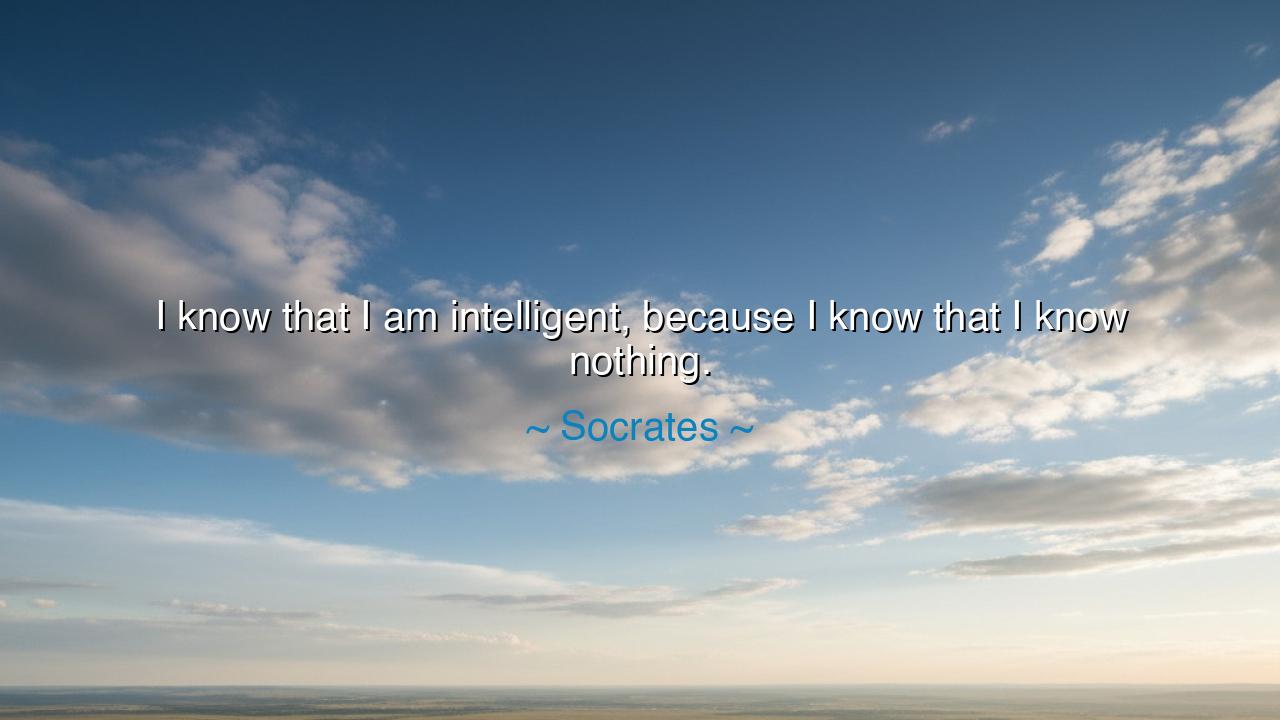
I know that I am intelligent, because I know that I know nothing.






“I know that I am intelligent, because I know that I know nothing.” Thus spoke Socrates, the father of Western philosophy, whose wisdom was not found in pride, but in the profound humility of self-awareness. In these words, he unveils the eternal paradox of true intelligence—that the wise man is not the one who claims to know everything, but the one who has seen the vastness of truth and recognized his own smallness within it. Knowledge, he teaches, begins not with answers, but with wonder; not with certainty, but with the honest admission of ignorance.
The origin of this saying lies in the story of the Oracle of Delphi, who declared that no man was wiser than Socrates. Puzzled by this pronouncement, Socrates set out to test it. He questioned poets, politicians, and craftsmen—those who claimed knowledge of virtue, justice, and truth—and found that, though they spoke with confidence, their wisdom was shallow. They believed they knew, yet could not explain what they meant. Socrates, by contrast, knew only that his understanding was limited. Thus he concluded that the Oracle had spoken truly: he was the wisest man, not because he possessed the most knowledge, but because he recognized the limits of his own understanding.
This was the birth of what the ancients called Socratic wisdom—the awareness that ignorance is not a weakness, but the beginning of strength. For when a man believes he knows all, he ceases to seek, and his soul becomes stagnant. But when he admits, “I do not know,” he opens himself to discovery. Socrates did not hoard knowledge; he pursued truth as one might pursue the horizon, forever moving, never arriving. In his not-knowing, he kept his spirit alive and his mind awake. The proud may fill themselves with opinion, but the humble remain vessels of learning, always ready to receive more.
To the modern ear, this might sound paradoxical—that intelligence is found in admitting ignorance—but history bears this out again and again. Consider Isaac Newton, who, after unlocking the laws of motion and gravity, declared that he felt like a child playing on the shore of an infinite sea of truth. Or Albert Einstein, who said, “The more I learn, the more I realize how much I don’t know.” These men, who changed the course of science, stood in awe before the mystery of the universe. Their greatness came not from arrogance, but from humility—the same humility that guided Socrates through the streets of Athens as he questioned men who thought themselves wise.
The lesson of this ancient truth is that wisdom does not come from possessing knowledge, but from seeking it endlessly. The wise do not boast, for they know that understanding is infinite and the human mind finite. The fool says, “I know everything I need to know,” and closes his heart. The wise say, “Teach me,” and in that openness lies the path to mastery. To live by Socratic wisdom is to remain a student of life until the final breath—to question, to listen, to learn, and to grow.
But Socrates also spoke these words as a challenge—to the arrogance of his age and to ours. His city condemned him for questioning sacred traditions, for revealing that those who claimed to know truth were blind to it. Yet he chose death over silence, drinking the cup of hemlock rather than betraying his principles. Through that sacrifice, he proved the purity of his philosophy: that truth is not owned by any man, and that to admit ignorance before the divine mystery of life is the highest form of intellectual honesty.
So, my child of thought and wonder, take this wisdom into your heart: know that you know nothing, and let that knowing make you wise. Question everything—not to destroy, but to understand. Be humble before the vastness of the world, for humility is the foundation of wisdom. Let curiosity be your torch, and never believe the journey of learning is complete. Speak less to prove, and more to discover. Listen deeply, think freely, and remember that truth, like the stars, shines brightest when the night of certainty has fallen away.
For in the end, Socrates’ wisdom is not a riddle but a revelation—that the mind awakened to its own limits becomes infinite. The fool builds walls with what he thinks he knows; the wise build bridges toward what they have yet to learn. Therefore, live as a seeker, not a knower. In every mystery, in every question, in every silence, whisper to yourself: “I do not know, and therefore, I am free to learn.”






AAdministratorAdministrator
Welcome, honored guests. Please leave a comment, we will respond soon